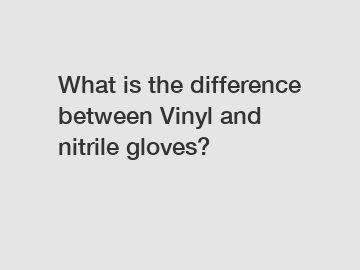What is the difference between Vinyl and nitrile gloves?
What is the difference between Vinyl and nitrile gloves?
Vinyl and nitrile gloves are two common types of disposable gloves that are widely used in various industries for protection and safety purposes. While both serve a similar purpose, there are distinct differences between the two. In this article, we will explore these differences, comparing the materials, properties, benefits, and drawbacks of vinyl and nitrile gloves.
1. Material:

Vinyl gloves are made from polyvinyl chloride (PVC), a synthetic material derived from petroleum. On the other hand, nitrile gloves are made from a synthetic rubber known as nitrile butadiene rubber (NBR). This distinction in materials plays a significant role in the overall performance and characteristics of the gloves.
2. Durability and Strength:
Nitrile gloves are generally stronger and more durable than vinyl gloves. Nitrile is known for its excellent puncture and tear resistance, making it highly resistant to chemicals, oils, and other substances. Vinyl gloves, while suitable for many applications, are more prone to punctures and tears, making them less durable overall.
3. Comfort and Fit:
Vinyl gloves offer a looser fit compared to nitrile gloves, providing greater comfort for individuals with larger hands or those who prefer a more relaxed fit. Conversely, nitrile gloves offer a snug fit, providing better tactile sensitivity and dexterity, which is crucial in tasks that require precision and fine motor skills.
4. Allergies and Sensitivities:
One significant advantage of nitrile gloves over vinyl gloves is that nitrile is hypoallergenic. Nitrile gloves pose a lower risk of causing allergic reactions, especially for individuals with latex allergies, as nitrile does not contain natural rubber latex proteins. Vinyl gloves, on the other hand, may cause allergic reactions in individuals sensitive to PVC or plasticizers used in their manufacturing process.
5. Chemical Resistance:
Nitrile gloves excel in chemical resistance, making them the preferred choice in industries dealing with hazardous chemicals and substances. They provide a reliable barrier against a wide range of chemicals, including solvents, oils, greases, and some acids. Vinyl gloves, while offering some chemical resistance, are not as effective as nitrile gloves in protecting against strong chemicals.
6. Cost:
Vinyl gloves are generally more affordable than nitrile gloves, making them a popular choice in industries where frequent glove changes are necessary, such as the food service industry. Nitrile gloves are relatively more expensive, which can be a limiting factor for industries with tight budgets.
7. Environmental Impact:
When it comes to environmental considerations, vinyl gloves have a higher environmental impact compared to nitrile gloves. Vinyl gloves take longer to break down in landfills and are not biodegradable. Nitrile gloves, on the other hand, can be recycled and are more environmentally friendly.
In conclusion, the choice between vinyl and nitrile gloves depends on several factors such as the application, specific requirements, and budget. While vinyl gloves may be suitable for tasks that do not involve harsh chemicals or demand high durability, nitrile gloves offer better protection, strength, and chemical resistance. Additionally, nitrile gloves are hypoallergenic and provide a better fit for tasks that require precision. It is essential to assess the specific needs and risks of the intended use to make an informed decision. Whether it is for healthcare, laboratory work, food handling, or any other industry, choosing the right type of disposable gloves is crucial for ensuring safety and maintaining a hygienic workplace environment.
If you are looking for more details, kindly visit factory price Vinyl Medical Gloves in bulk, Disposable Latex Gloves China supplier, wholesale Vinyl Medical Gloves in bulk.
286
0
0

Comments
All Comments (0)